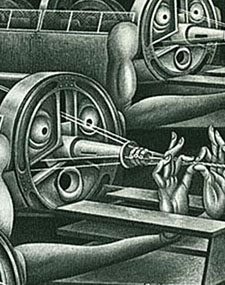Brian Rotman: Becoming Beside Ourselves: The Alphabet, Ghosts, and Distributed Human Being (2008)
Filed under book | Tags: · affect, alphabet, body, computing, gesture, god, language, mathematics, networks, posthuman, representation, self, semiotics, speech, subjectivity, technology

Becoming Beside Ourselves continues the investigation that the renowned cultural theorist and mathematician Brian Rotman began in his previous books Signifying Nothing and Ad Infinitum…The Ghost in Turing’s Machine: exploring certain signs and the conceptual innovations and subjectivities that they facilitate or foreclose. In Becoming Beside Ourselves, Rotman turns his attention to alphabetic writing or the inscription of spoken language. Contending that all media configure what they mediate, he maintains that alphabetic writing has long served as the West’s dominant cognitive technology. Its logic and limitations have shaped thought and affect from its inception until the present. Now its grip on Western consciousness is giving way to virtual technologies and networked media, which are reconfiguring human subjectivity just as alphabetic texts have done for millennia.
Alphabetic texts do not convey the bodily gestures of human speech: the hesitations, silences, and changes of pitch that infuse spoken language with affect. Rotman suggests that by removing the body from communication, alphabetic texts enable belief in singular, disembodied, authoritative forms of being such as God and the psyche. He argues that while disembodied agencies are credible and real to “lettered selves,” they are increasingly incompatible with selves and subjectivities formed in relation to new virtual technologies and networked media. Digital motion-capture technologies are restoring gesture and even touch to a prominent role in communication. Parallel computing is challenging the linear thought patterns and ideas of singularity facilitated by alphabetic language. Barriers between self and other are breaking down as the networked self is traversed by other selves to become multiple and distributed, formed through many actions and perceptions at once. The digital self is going plural, becoming beside itself.
With a Foreword by Timothy Lenoir
Publisher Duke University Press, 2008
ISBN 0822342006, 9780822342007
176 pages
Commentary (Ben Pritchett, Mute)
Review (Stevan Harnad, Times Literary Supplement)
Amodern 1: The Future of the Scholarly Journal (2013)
Filed under journal | Tags: · academia, humanities, networks, publishing, research, technology

Amodern is a new peer-reviewed, open access scholarly journal devoted to the study of media, culture, and poetics. Its first issue is devoted to a critical conversation about the future of the scholarly journal.
With contributions by Scott Pound, Michael Nardone and Kathleen Fitzpatrick, Scott Pound and Jerome J. McGann, Johanna Drucker, Benjamin J. Robertson, Gary Genosko, and Nick Montfort.
Editors: Scott Pound, Darren Wershler
Managing Editor: Michael Nardone
Publisher Concordia University and Lakehead University, February 2013
View online (HTML articles)
Comment (0)Arndt Niebisch: Media Parasites in the Early Avant-Garde: On the Abuse of Technology and Communication (2012)
Filed under book | Tags: · art history, avant-garde, dada, futurism, mass media, media ecology, networks, noise, parasite, performance, poetry, radio, sound, subversion, technology

“The avant-garde movements of the early twentieth century inhabited the media discourses of their time like parasites, constantly irritating and taking from them. Dadaists ripped images of a mechanically reproduced world out of newspapers and magazines and reassembled them in their collages. Futurists instrumentalized the brevity of telegraph messages for their free word poetics. Artists such as F.T. Marinetti, Raoul Hausmann and Luigi Russolo constantly abused existing media technologies and hijacked public communication. This study traces these subversive tactics from avant-garde poetry to media technological experiments with radio tubes.”
Publisher Palgrave Macmillan, 2012
Avant-Gardes in Performance series
ISBN 1137276851, 9781137276858
250 pages
PDF, PDF (updated on 2016-3-15)
Comments (3)
